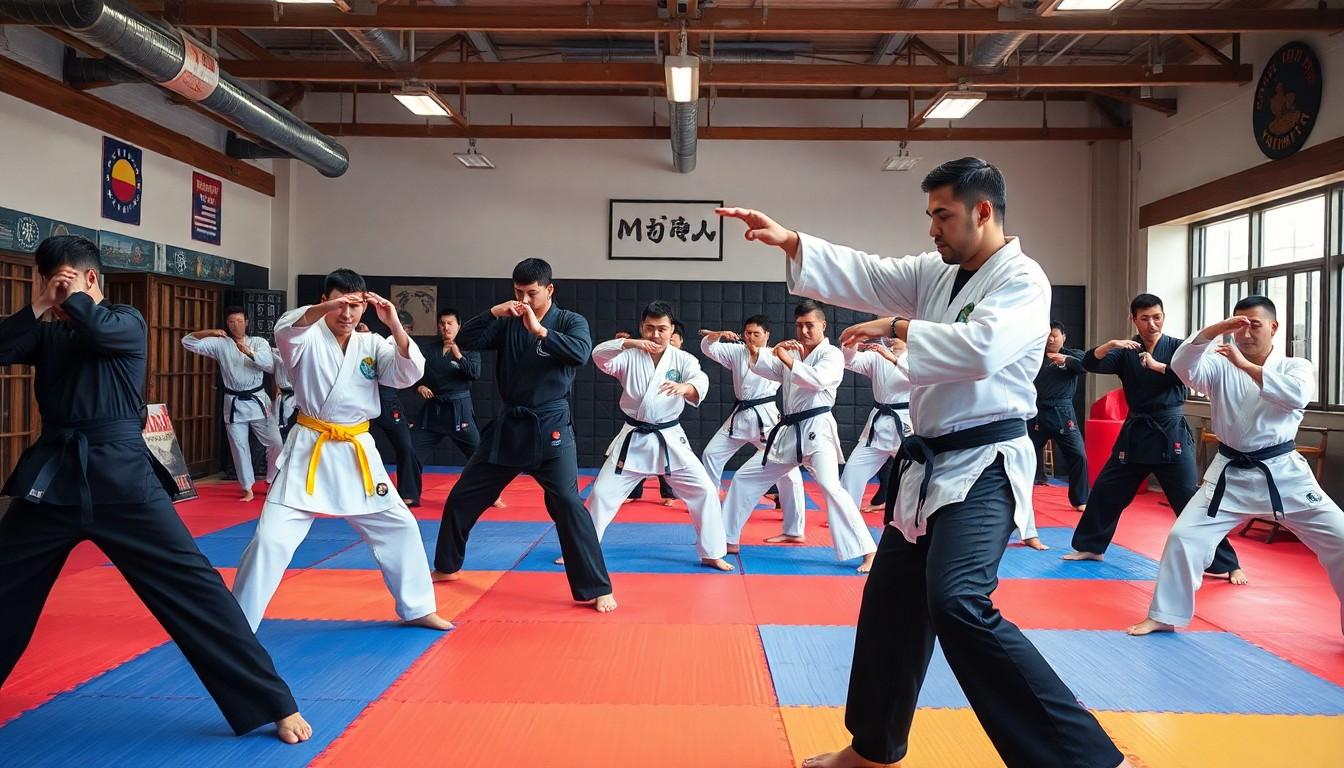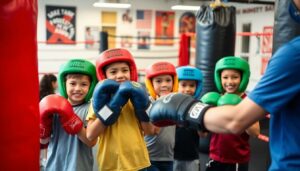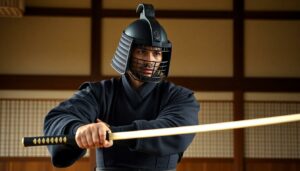Table of Contents
ToggleIn a world where self-defense is just as important as knowing how to order a fancy coffee, modern martial arts has stepped into the spotlight. Gone are the days when martial arts were solely about ancient traditions and rigid forms. Today, they blend practicality with a splash of flair, making them accessible and appealing to everyone from fitness fanatics to those just looking to kick some stress out of their lives.
Overview of Modern Martial Arts
Modern martial arts encompass a variety of disciplines that blend self-defense techniques with fitness and mental well-being. Many individuals practice these arts for practical self-defense applications. Others seek stress relief through dynamic movement and structured routines.
Some popular modern martial arts styles include Brazilian Jiu-Jitsu, Muay Thai, and Krav Maga. Brazilian Jiu-Jitsu focuses on ground fighting and submission techniques, emphasizing leverage and technique over brute strength. Muay Thai incorporates striking techniques and clinch work, enhancing cardiovascular fitness while teaching powerful kickboxing skills. Krav Maga stands out for its emphasis on real-life self-defense scenarios, preparing practitioners for potential threats with effective strategies.
The role of martial arts in personal development also garners attention. Many practitioners experience increased discipline, confidence, and focus. These benefits contribute to better performance in daily life and enhanced self-esteem. Additionally, modern martial arts foster a sense of community, bringing together diverse groups of people in a supportive environment.
Martial arts training often integrates competitive elements, allowing students to participate in tournaments and sparring sessions. This competitive aspect drives skill development and motivates individuals to push their limits. As martial arts evolve, instructors adapt training methods to align with contemporary needs and preferences.
Practicing modern martial arts offers a well-rounded approach to physical fitness and self-defense. Individuals gain practical skills alongside a deeper understanding of their bodies and minds. Engaging in these activities promotes lifelong learning and growth while maintaining the rich traditions of martial arts history.
Evolution of Modern Martial Arts

Modern martial arts have significantly transformed from their traditional roots, influenced by various historical factors and key developments. This evolution caters to a diverse audience seeking both fitness and self-defense.
Historical Influences
Historical factors shape modern martial arts. Ancient practices, such as Chinese Kung Fu and Japanese Jiu-Jitsu, influenced many contemporary styles. Cultural exchanges also played a significant role. Expansion through globalization introduced techniques from various countries, blending them into new forms. The advent of martial arts films popularized these disciplines, attracting millions to training. Societal needs for self-defense during times of conflict further propelled the evolution of techniques and styles.
Key Developments
Key developments marked the progression of modern martial arts. The emergence of mixed martial arts (MMA) exemplified this shift, combining elements from various disciplines for effective combat. Standardization of techniques promoted by organizations also enhanced training accessibility. Popular competitions, including UFC, garnered widespread attention, driving interest and participation. Additionally, instructors adapted curricula to address contemporary safety concerns and fitness trends. These innovations established martial arts as not just self-defense, but a comprehensive lifestyle choice.
Popular Styles of Modern Martial Arts
Various styles of modern martial arts cater to different interests and goals. Each discipline presents unique techniques and philosophies.
Brazilian Jiu-Jitsu
Brazilian Jiu-Jitsu focuses on ground fighting and grappling techniques. Practitioners learn to control opponents through leverage, allowing individuals of all sizes to defend themselves effectively. This style emphasizes positional strategy and submissions, promoting both self-defense capabilities and physical fitness. Regular training enhances flexibility, strength, and mental discipline. Competitions, including tournaments, provide opportunities for practitioners to showcase skills and progress through belt ranks. Various techniques aim to neutralize larger opponents, making it an ideal choice for individuals seeking effective self-defense strategies.
Muay Thai
Muay Thai, known as the “Art of Eight Limbs,” employs punches, kicks, elbows, and knees in striking techniques. This striking martial art builds powerful cardiovascular endurance and enhances overall fitness. Practitioners gain both striking and clinch-fighting techniques, making it a versatile choice for self-defense. Structured training sessions often include pad work, sparring, and conditioning drills. Benefits extend beyond physical fitness, as students often experience increased confidence and mental fortitude. Muay Thai’s rich history and culture add depth, attracting enthusiasts worldwide seeking a blend of tradition and modern training.
Mixed Martial Arts (MMA)
Mixed Martial Arts combines various fighting styles, including striking and grappling techniques. Athletes train in disciplines like Brazilian Jiu-Jitsu, Muay Thai, wrestling, and boxing, resulting in an extensive skill set. The sport focuses on an adaptive approach, enabling fighters to compete in various formats and environments. Rigorous training regimens build strength, agility, and endurance. MMA competitions showcase athletes’ diverse skill sets, pushing them to refine techniques continuously. Competitiveness fosters camaraderie and discipline, appealing to those seeking a challenging yet rewarding martial arts experience.
Benefits of Practicing Modern Martial Arts
Practicing modern martial arts offers numerous benefits, enhancing both physical and mental health. Individuals often find themselves reaping rewards that extend beyond the training mat.
Physical Fitness
Engagement in martial arts significantly improves physical fitness. Training in disciplines like Muay Thai and Brazilian Jiu-Jitsu enhances cardiovascular endurance, strength, and flexibility. Practitioners build muscle while refining their coordination and balance. Furthermore, high-intensity workouts contribute to weight management and overall body composition. Each session provides a full-body workout, making martial arts an effective alternative to traditional gym routines. Participants often report increased energy levels and improved stamina in daily activities. Commitment to regular training ensures ongoing fitness improvements, promoting long-term health benefits.
Mental Wellbeing
Mental wellbeing also receives a boost through martial arts practice. Structured training fosters discipline and boosts self-confidence. Participants often experience reduced stress levels due to the focus required during sessions. The sense of community and camaraderie among practitioners creates a supportive environment. Mindfulness plays a crucial role, allowing individuals to concentrate and enhance mental clarity. Those engaging in martial arts develop coping strategies for everyday challenges, contributing to overall emotional resilience. Additionally, personal goals achieved in martial arts lead to a substantial increase in self-esteem, further promoting mental health.
Modern martial arts represent a dynamic fusion of self-defense and fitness that appeals to a broad audience. By embracing various disciplines practitioners not only enhance their physical capabilities but also cultivate mental resilience. The journey through martial arts fosters personal growth and community connection, making it a rewarding pursuit for anyone.
With its roots in ancient traditions and its evolution into contemporary practices, modern martial arts continue to inspire individuals to challenge themselves and achieve their goals. Whether for self-defense or overall well-being, engaging in these disciplines offers a path to improved health and confidence. As the landscape of martial arts evolves further, it remains a powerful tool for personal transformation and empowerment.




